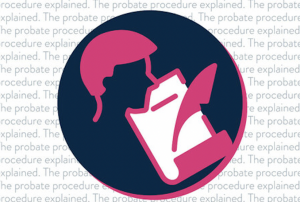9th June 2023
The Probate Procedure Explained…

Have you been named as executor in a Will and you’re not sure where to begin? Or would you just like some clarity on the probate procedure? Our Lucy Head has answered some commonly asked questions below…
Do I need a Grant of Probate or Letters of Administration?
When someone dies with a will, a Grant of Probate may be needed and when someone dies without a will (intestate), the Intestacy Rules will apply, and a Grant of Administration may be necessary.
It is not always necessary to apply for a Grant of Probate/Letters of Administration and often if assets are owned jointly between husband and wife, they can be transferred to the survivor of them without a Grant of Probate/Letters of Administration. If the deceased owned assets jointly as joint tenants, for example any land or property, bank and building society accounts, or life policies, these may automatically pass to the other joint owner by the law of survivorship.
Depending on the value of the deceased’s assets, a Grant of Probate may be needed if the deceased owned assets in their sole name over a certain value regardless of whom they have chosen to leave the assets to.
The type of ownership of assets in an estate and the value of such assets will establish whether you do need to apply for a Grant of Probate.
How long does it take?
Once you have applied for a Grant of Probate or Letters of Administration, the timeframe for receiving the relevant Grant is currently approximately 16 weeks. If inheritance tax was payable on the estate before applying, then this will add at least another 4 weeks to the process. Once the Grant of Probate or Letters of Administration is issued, the complexity of the estate will thereafter determine the timescales when subsequently dealing with the estate.
Do I have to pay Inheritance tax?
This is a complex area and specific advice will need to be obtained as the amount of nil rate band available will take into account individual circumstances and will also need to consider whether any gifts have been made in the 7 years prior to death.
There is a nil rate band threshold which applies which is currently £325,000. This increases to £650,000 if your spouse has predeceased and left everything to you as you can also take advantage of their nil rate band. An additional £175,000 residence nil rate band threshold can be utilised in certain circumstances and again there is a transferable nil rate band available on second death. This means that for a married couple planning to leave their estate to their children/direct descendants there is potentially £1,000,000 that can be left free of inheritance tax.
There are also a number of exemptions and reliefs which may apply to significantly reduce the amount of tax payable or relieve the estate from tax altogether. Spousal and charity exemptions will entirely exempt the value of the property from tax when passing to a spouse/civil partner or to a charity.
There are also a number of specific reliefs available to Agricultural property and businesses and specific advice needs to be sought regarding these assets.
When does tax need to be paid?
The general rule is that inheritance tax (IHT) must be paid no later than 6 months from the end of the month which someone has died. Liquid assets (such as savings and bank accounts) will need to pay IHT immediately before a Grant of Probate is issued, however any tax due on a property can be paid in instalments over a 10-year period.
Can my property be transferred without a Grant of Probate?
This will depend on whether the property is owned as Joint Tenants or Tenants in Common. If you are unsure how your property is co-owned, this information can be obtained from title deeds at the Land Registry. If the property is owned as Joint Tenants, no Grant of Probate will be required and the property will automatically pass to the surviving owner, who will become the sole owner of the property. If a property is owned as Tenants in Common, a Grant of Probate/Letters of Administration will be necessary to transfer the interest in the property.
